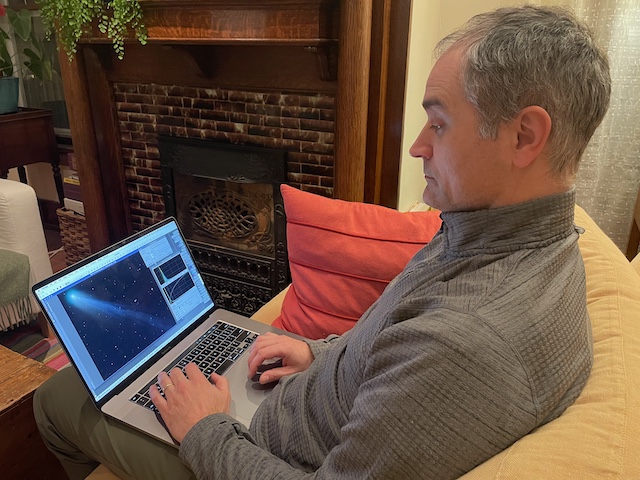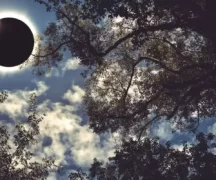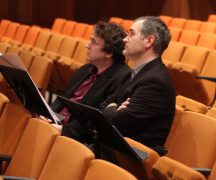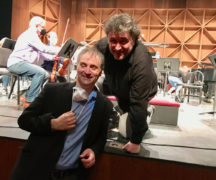By DAVID DUPONT
BG Independent News
Confronting a cosmic spectacle, BGSU did what academic institutions do: formed a committee.
On April 8 Bowling Green will be in the path of a total solar eclipse with thousands of visitors expected to descend on town to catch a good view. The university created a committee to decide how best to accommodate the visitors and celebrate the celestial wonder.
When Dean Bill Mathis of the College of Musical Arts had to appoint someone to represent the CMA, he turned to “the Astro guy,” professor of composition Chris Dietz, who is an amateur astro photographer.
“This semester with this eclipse, my hobby has become enmeshed in my job,” Dietz said.
How other communities and campuses dealt with the 2017 eclipse provided a guide on what BGSU should do. “A large gathering seemed to go well to have these collective experiences with the oohing and ahhing together,” he said.
The gathering in Doyt Perry Stadium will concentrate the exuberance of the solar eclipse experience.
What’s most notable about an eclipse is that “humanity engages with the movement of celestial bodies. That’s why they are such important historical events.”
Music will be a central part of that celebration. It was natural to involve the Falcon Marching Band since the stadium is their home venue. Band director Jon Waters will pull out the band’s “space set,” Dietz said, with music ranging from Richard Strauss’s “Also sprach Zarathustra” used in the film “2001: A Space Odyssey” to the pop standard “Fly Me to the Moon.”
Someone, it may have been Dietz, suggested that the project engage student composers. After all, when people attend a planetarium show, the visuals are occupied by music, he said. But instead of using canned music, they would use music composed specifically for the event by students.
They drew on the expertise of Colin Hochstetler who works in the music archives at Jerome Library. He has studied planetarium show music.
[RELATED: Sounds of solar eclipse planetarium shows have evolved into cinematic wonders]
Dietz said the music has evolved from its early roots in electronic music to a more lush, meditative, and trippy sound that still retains a bit of roughness from its formative years. He likened it to the sounds featured on the NPR show “Music from the Hearts of Space.”
Nine students, representing the studios of all the composition teachers, signed up for the assignment. Each will write about 10 minutes of music.
The guidelines are that it must fit within the genre. The intent is that it will be an ambient soundtrack. “We don’t expect anyone to sit with their hands in their lap listening,” Dietz said.
The compositions will be recorded and play over the loudspeakers during the gathering in Doyt interspersed with marching band performances.
However, once the eclipse starts there will be no music. “We just want people to focus on that.”
That’s what Dietz will be doing. Despite his growing involvement with astrophotography, he will not be photographing the event. He’ll be coordinating the music as well as experiencing the eclipse with his wife and their two children.
Dietz got started on his hobby through his family. About 10 years ago he decided to buy a telescope for his son for his birthday. His wife, Emily, said: “Don’t just get him a little dinky toy. Get a real telescope you can actually use.”
They set it up in the driveway of their Perrysburg home. Dietz had never looked through a telescope before. He got it focused on Jupiter. “ I was stunned to see the cloud bands and stripes and the four moons,” he said. “I was absolutely stunned. Why have I not been looking in telescopes for the last 40 years?”
He’d always been interested in science, but it took his son turning 5 to get him hooked on studying the skies. “I was too busy making music.”
Now some of the vintage guitars he’d collected were sold off for astronomical equipment.
He joined the Toledo Astronomical Association. He started going to the Wood County Park District’s Beavercreek Preserve, which is a dedicated astronomy park. “You can go there at night and not be arrested,” he said.
The association was a gathering of like-minded guys eager to share their knowledge. While they share a love of astronomy, they are otherwise a diverse lot.
Learning for the more experienced members was how he learned the ropes.
One member worked for ODOT and he had hooked up a security camera to his telescope. The camera stacks images that allows very dimly lit objects to be seen. Now Dietz could see beyond the planets in the solar system into deep space. Viewing the planets are like the freshman level, he said. Deep space is the next level.
The cameras are cheap, he noted, and the resolution is poor. “This was just cheap crap from China,” he said. “But it worked.” What he could now see was a revelation.
As the interest in astronomy increased, so did the available technology. When the pandemic hit, people had time and more disposable income. Also, digital camera technology took a major leap forward. Dietz was now selling his astronomy gear to purchase upgrades, feeding his star gazing habit.
“I wanted to make my images look clearer and clearer,” he said. He started posting them on astrobin.com, a site for professional and amateur photographers. “I started doing that and refining it. It became a little bit more than a hobby. People have expressed interest in publishing these photos,” Dietz said. “There’s really no end to it. You learn a lot about how to take the pictures and how to process. But you learn a lot about the universe, too.”
Dietz will will speak on “Astrophotography for Amateurs” at the BGSU Planetarium, Thursday March 28 at 7:30 p.m. following a free planetarium show starting at 6:30 p.m. as part of the university’s series of talks related to the eclipse.
The upcoming eclipse offers Dietz another lesson. “I’m very excited to experience it.” He’s seen photographs, but has never viewed one. He anticipates not just viewing the moon’s shadow blocking out the sun, but also the way the shadows change and how the birds react, and all the phenomenon unique to a total solar eclipse.





